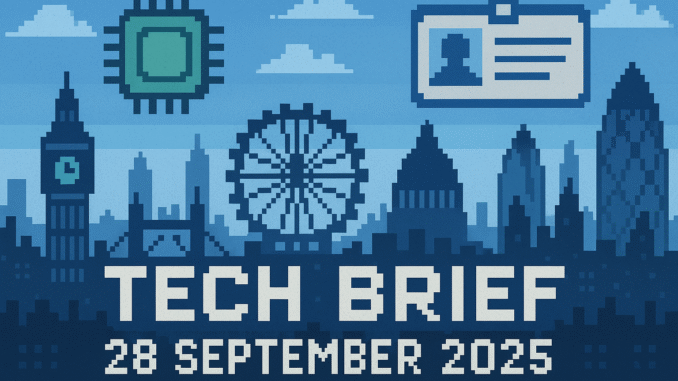
Tech Brief 28 September 2025 lands with a sideways glance at British digital identity, the return of homegrown chips, and a nursery cyberattack that’s hard to ignore. Today is about old problems in new circuits, institutions learning from their own code, and what happens when technology’s good intentions trip over their own feet. Missed yesterday’s Tech Brief? Catch up here before diving in.
Starmer Unveils Mandatory Digital ID Card Plan
The British government has introduced plans for a digital ID card, now being called the “Brit card,” which would be mandatory for all working-age adults. Labour claims this is its answer to outdated ID checks and a fragmented system, giving both public and private services a single source of truth, something we’ve all wished for in those endless login loops. Civil liberties campaigners are spelling out familiar warnings in new language. Unlike the Blair-era physical cards, this scheme is digital: mobile-ready, constantly updating, and potentially accessible to more agencies than ever before. Privacy groups are worried about both data breaches and the slow erosion of personal autonomy. How much of yourself do you want living in government servers? Supporters say it will speed up services and cut fraud. Critics see a new chapter in Britain’s on-again, off-again relationship with surveillance technology.
UK Invests £19m in National Semiconductor Centre
£19 million is the headline number, with more promised, as the UK government tries to revive its semiconductor sector. The new National Semiconductor Centre is supposed to boost domestic processor design, attract engineers, and shore up skills that drifted abroad. There’s also £35 million for training and £24 million for CHERI silicon research, which is aimed at making hardware itself more resistant to cyberattacks. Not since the heyday of ARM, Sinclair, and Acorn has there been such a pointed focus on British chip design. Industry analysts point out that this isn’t about catching up to Asia or America overnight; it’s about rebuilding sovereign capacity. Will it work, or is this just another government plan waiting to be outpaced by faster, nimbler firms? The money is there, and the nostalgia is being skilfully courted. The results will take more than just funding.
London Nursery Group Suffers Data Breach Affecting 8,000 Children
Kido International, which runs 18 nurseries in London, has reported one of the largest UK data breaches involving children. Personal details for over 8,000 children, including names, addresses, and photographs, were stolen. The attackers demanded a ransom and threatened further leaks if Kido doesn’t comply. For families, this is more than a technical failure. It’s the fear that their children’s private information is now circulating beyond their control. This isn’t just about technology failing; it’s about institutions failing to keep up with those who look for easy targets in the weakest links. Yesterday’s story about digital ID security feels suddenly more urgent. It’s one thing for adults to be data-mined, but quite another when children’s details get traded like second-hand game cartridges. Privacy lessons, it seems, are still being written.
From the Wayback Machine
On This Day: 1925 – Seymour Cray, the “father of supercomputing,” was born in Wisconsin. Cray’s legacy stretches from the CDC 6600 in 1964, widely considered the first successful supercomputer, to the curved chassis of the Cray-1 in 1976. He introduced vector processing and parallel computing to labs, weather stations, and national defence. Every time your desktop shaves seconds off a simulation, it’s a faint echo of what began with Cray’s circuits and the relentless pursuit of speed.
Today’s Big Question
Can the push for a digital ID and British-built chips really restore public trust, or are we just repeating the cycle where big ideas falter at rollout? Tech Brief 28 September 2025 doesn’t have the answer, but someone’s bound to try.
Pour yourself a cup of nostalgia, check your backup, and keep an eye out for the next patch.
Missed yesterday’s Tech Brief? Catch up here

Leave a Reply